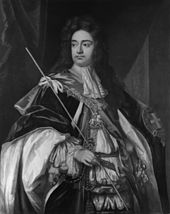Charles Sackville, 6th Earl of Dorset

Charles Sackville, 6th Earl of Dorset and 1st Earl of Middlesex, KG (24 January 1643 – 29 January 1706) was an English poet and courtier.
Early life
Sackville was born on 24 January 1643,
Career

During King Charles II's first Parliament, Sackville sat for East Grinstead in Sussex. He had no taste for politics, however, but won a reputation at Whitehall as a courtier and a wit.
He bore his share in the excesses for which Sir
Something in his character made his follies less obnoxious to the citizens than those of the other
In 1667, Pepys lamented that Sackville had lured

His gaiety and wit secured the continued favour of Charles II, but did not especially recommend him to
He was a generous patron of men of letters. When
Marriages
Sackville was three times married; he married his first wife
Works
The fourth act of Pompey the Great, a tragedy translated out of French by certain persons of honour, is by Dorset. The satires for which Pope classed him with the masters in that kind seem to have been short lampoons, with the exception of A faithful catalogue of our most eminent ninnies (reprinted in Bibliotheca Curiosa, ed. Goldsmid, 1885). The Works of the Earls of Rochester, Roscommon and Dorset, the Dukes of Devonshire, Buckinghamshire, &c., with Memoirs of their Lives (1731) is catalogued (No. 20841) by
Portrayal in film
Sackville is portrayed by
References
- Oxford Dictionary of National Biography. Retrieved 23 December 2016. (subscription required)
- ^ a b c d Chisholm 1911, p. 433.
- ^ Pepys' Diary, p124
- ^ Kenyon, J.P. The Popish Plot Phoenix Press reissue 2000 p.306
- ^ Chisholm 1911, pp. 433–434.
- ^ "Library and Archive catalogue". Royal Society. Retrieved 28 February 2012.[permanent dead link]
- ^ a b Chisholm 1911, p. 434.
Sources
- . Dictionary of National Biography. London: Smith, Elder & Co. 1885–1900.
- This article incorporates text from a publication now in the public domain: Chisholm, Hugh, ed. (1911). "Dorset, Earls, Marquesses and Dukes of". Encyclopædia Britannica. Vol. 8 (11th ed.). Cambridge University Press. pp. 431–434.
